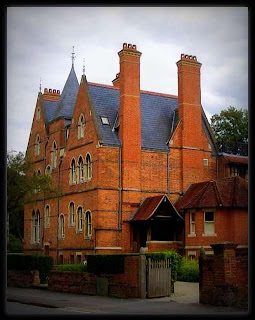Spent all my time with
a crammer
And then only managed a
gamma,
But the girl over
there,
With the flaming red
hair,
Got an alpha plus
easily – damn her!
– Anon, c. 1900
I love walking Oxford admiring
the architecture, pretty details of the houses, narrow cobblestone streets, and the
gardens.
Hand-carved limestone plaque, circa 1850.
Although famous for its lime-stone-built
colleges and churches, Oxford in the 19th century became a city of brick. Vast
brick-built houses – some Gothic, some "Queen Anne" – fill the
grander streets of North Oxford. Smaller brick terraces line the streets off
the roads in East Oxford. And out beyond the station is a further group of
small streets near the river in the area known as Osney. Some of these are
built of brick in more than one color, and here the builder has addressed the
issue of what to do with the blank wall at the end of a terrace in a refreshing
way.
Osney old power station
North Oxford inspires in
me special affection, call it 'Betjeman Nostalgia', that
generation of great Anglo-Catholics and academics which is rapidly
slipping away. Some modern souls condemn North Oxford as hideous
and Gothic.
There is an atmosphere of
calm in the centuries-old church of St Mary's Bloxham. Outside are heavily weathered
gravestones marking the passing of generations.
Ripon College at Oxford. The
College is outside the City at Cuddesdon with wonderful views over rolling
Oxfordshire countryside. The Bishop Edward King Chapel was designed by Niall
McLaughlin and is next to a huge copper beech which is about three hundred years
old. From the outside it looks a little like a drum or an upturned boat. Inside
it is beautifully light with the sunlight creating wonderful effects on the
stone and furniture made from ash.
Ü













